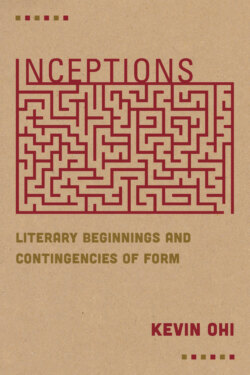Inceptions

Реклама. ООО «ЛитРес», ИНН: 7719571260.
Оглавление
Kevin Ohi. Inceptions
Contents
Exordium
1. Revision, Origin, and the Courage of Truth
2 “First Love”
3. Robinson Crusoe and the Inception of Speech
4. The Clock Finger at Nought
5. Proto-Reading and the Positing of Character in Our Mutual Friend
6. Ovid and Orpheus
7. Wallace Stevens and the Temporalities of Inception and Embodiment
8 “Epitaph, the Idiom of Man”
9. Etiology, Solitude, and Queer Incipience
Acknowledgments
Notes. Exordium
1. Revision, Origin, and the Courage of Truth: Henry James’s New York Edition Prefaces
2. “First Love”: Gesture and the Emergence of Desire in Eudora Welty
3. Robinson Crusoe and the Inception of Speech
4. The Clock Finger at Nought: Daniel Deronda and the Positing of Perspective
5. Proto-Reading and the Positing of Character in Our Mutual Friend
6. Ovid and Orpheus
7. Wallace Stevens and the Temporalities of Inception and Embodiment
8. “Epitaph, the Idiom of Man”: Imaginings of the Beginning
9. Etiology, Solitude, and Queer Incipience
Index
Отрывок из книги
Those masterful images because complete
Grew in pure mind but out of what began?
.....
Because each chapter provides its own framework, I do not attempt here to offer a systematic account of theories of beginning, inception or origin—but turn, instead, to a few texts where beginning raises the question of the conditions of possibility of the text, often in realms removed from the explicit concerns of the chapters that follow. Thus, for example, in “The Discourse of History,” Roland Barthes responds to Benveniste’s opposition between “discourse” and “history,” pointing to the ways that historical writing is ruptured from within by its moment of enunciation—by, in other terms, its inception. Barthes turns at one point to the “organizing shifters”—the shifters through which the historian “organizes his own discourse, taking up the thread or modifying his approach in some way in the course of narration” (points of reference to his own discourse [as enunciation, or what the translator renders as “uttering”] as it structures the historical material, to, in other terms, the fact that the discourse was composed).26 These shifters, Barthes asserts, have a “destructive effect … as far as the chronological time of the history is concerned. This is a question of the way historical discourse is inaugurated, of the place where we find in conjunction the beginning of the matter of the utterance and the exordium of the uttering” (9). Not dissimilar to the convergence marking the crisis of the end of the poem, that conjunction is a problem, Barthes suggests, because it marks the coalescence of two disjunctive times—of the utterance or the writing and of the historical time it would comprise or represent,27 between the time of “discourse” and the time of “history.” The two forms of inauguration he notes (the invocation that recalls the opening of the epic and the prefatory commentary that locates the written history itself as an object of prospective or retrospective commentary) thus signal a crisis of inception. Barthes does not dwell on it in this essay, but inception marks an irreparable internal fracture in the discourse of history that is indistinguishable from its conditions of possibility.
In his study of “narrative beginnings,” A. D. Nuttall elaborates on the logic and consequences of a pair of claims by Ernst Robert Curtius about the Muses: that they disappear in modern poetry, and that they come (in a displacement he first sees in Prudentius) to be replaced in the traditional invocatio by the “poet’s soul.”28 (Ovid, as we will see, has it both ways in the Metamorphoses, appearing to invoke his own spirit or consciousness before ceding that place to unnamed gods.) For Nuttall, then, the question of beginning is a question of inspiration and authority: the question, enacted in the proem or invocatio, of what allows the poet to begin speaking, of whose voice this is, and whether it can ground or institute itself. Although Nuttall (like Curtius) does not draw out this particular implication, the individual poetic voice would seem to emerge from the internalization of a foreign, impersonal voice—of a deity or deities that speak through one; the shift from oral to written poetry and the adaptation of classical models for Christian poetry—both of which he does dwell on—could be read as moments in that history of inspiration.29 In Nuttall’s argument, this question of grounding emerges in the tension between “natural” and “artificial” openings; rephrasing Horace’s distinction between a beginning ab ovo and one in medias res, this is an opposition between an absolute or a relative beginning, one might say, or, in other terms, the beginning of the world as opposed to the self-consciously “formal” or limited (or therefore “artificial”) beginning of a text.30 These are among the tensions I hope to name with the term inception.
.....